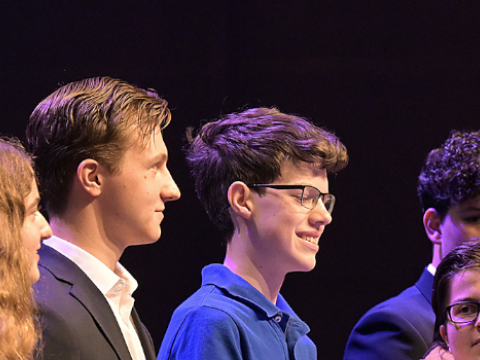
Landheim Ammersee congratulates siblings Julia and Alexander Trapp on their 2nd place in the national "Jugend forscht" competition
Monday morning (22 May) - and an entire school is celebrating its successful classmates: after three exciting days from 18 - 21 May in Bremen, the Landheim siblings - Julia Trapp, 15, 9th grade at Ernst-Reisinger-Gymnasium and Alexander Trapp, 18, 11th grade at Julius-Lohmann-Gymnasium - took second place in the final of the national Jugend forscht competition under the motto "Make ideas big!" in the chemistry category. In his laudatory speech for the two Landheim students, headmaster Matthias Bangert summarised their journey from Julia's school project in 8th grade to yesterday's final once again for the school community, a great achievement that was met with deafening applause and a few waves of la-ola from the almost 300 students.
The award ceremony in Bremen was an entertaining and festive closing event, which was also attended by the recently re-elected Mayor of Bremen, Andreas Bovenschulte, and the Federal Minister of Education, Bettina Stark-Watzinger, who presented some of the national prizes herself. Julia and Alexander received the "Prize for linking theory with chemical practice" from the Society of German Chemists in addition to the 2nd prize in the national competition - and the two siblings will meet Federal Chancellor Olaf Scholz at his reception for the national winners and runners-up at the Federal Chancellery in Berlin on 26 September.
The final was preceded by various expert discussions on the project with the Jugend forscht jury throughout Friday and on Saturday afternoon the young researchers answered questions from an interested general public, for whom the exhibition was open on Saturday.
And what happens now? After a brief disappointment at narrowly missing out on first place, plans were made on the way back to improve the project even further and compete again in 1-2 years' time ... But even now, the biochemical redox flow battery already has great commercial potential. In conversation with the foundation and school director, Alexander Trapp explains: "During the preliminary round of the regional competition in March, we were approached by a patent attorney to have our project idea protected with a patent application, which we fortunately put into practice straight away. At the national final at the weekend, we already had some interesting contacts with suppliers from the automotive industry."
